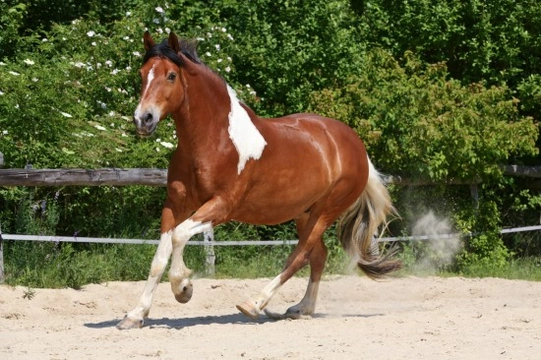
Should I Give My Horse Electrolytes?
As the weather warms up, it's that time of the year when people start to put their horses through their paces in preparation for the showing and competing season. It's when owners start thinking about adding an electrolyte supplement to their horse's feed to help maintain performance and studies have shown that this is essential when it comes to ensuring horses are in good condition before, during and after they compete.
The Benefits of Electrolyte and Salix Supplements
Many Thoroughbreds and performance horses are given Salix which is also known as furosemide, as a way of reducing the chances of them suffering a exercise-induced pulmonary haemorrhage. The reason they are given this supplement is because of its diuretic qualities which helps reduce any re-absorption of sodium into a horse's kidneys.
Studies have shown that electrolytes are an essential part of a feeding programme and in particular for performance horses. The reason is because electrolytes play a very important role when it comes to maintaining fluid balance, osmotic pressure and muscle and nerve activity at normal levels.
A horse that's asked to perform strenuous exercise will lose a great deal of sodium, potassium and chloride through their sweat. This loss can lead to them suffering weakness and muscle fatigue. It also decreases their need to rehydrate themselves. In short, it is really important for a horse to begin strenuous exercise with the correct levels of electrolytes in their systems in order to prevent too much loss through sweat as they compete.
Horses that don't have enough electrolyte levels when they are asked to do any strenuous exercise will typically lose anything from 5 to 15 litres of sweat an hour. However, this does depend on several factors which includes the following:
- Duration of exercise
- Intensity of exercise
- The ambient temperature
- Humidity levels
How to Work Out a Horse's Electrolyte Needs
It's important to know just how much potassium, sodium and chloride a horse may be losing in order to work out their electrolyte needs. The best place to start is by assessing their feed. Most forage is pretty high in potassium whereas unfortified hay and grain feeds don't contain enough sodium and the amount of chloride they contain tends to vary quite a lot too. With this said, if fed in the right quantities, this should provide a horse with enough potassium to meet their daily needs.
Horses that are in light work or at rest would only need to be given access to a good quality salt block. However, horses in moderate work or that sweat a lot during exercise would benefit from being given an electrolyte supplement which can be added to their normal feed ration. Electrolyte supplements need to be high in both chloride and sodium but with a lower level of potassium in them.
It's not the best idea to add electrolytes to a horse's water source because it could put them off drinking which is something that needs to be encouraged when they dehydrated. If the supplement is added to water, then it's very important that a second water bucket is made available that doesn't contain any of the supplement.
Avoid Electrolytes that Contain Dextrose
There are a few electrolyte supplements on the market that contain dextrose (sugar) which claim to improve electrolyte absorption, but there is no evidence of this actually working which basically means they are not that worthwhile. In short, it's better to stick to the basics rather than make life more complicated for yourself.
Electrolytes and Good Feed Improve Performance
Supplementing a horse's feed with electrolytes can improve their performance. However, they need to be added to a horse's diet in conjunction to them being fed good quality forages and a well thought out balanced diet to meet both their nutritional and performance needs. With this said, horses that are in light work or at rest would not need to be given an electrolyte supplement because by giving them free access to a salt block should meet all their requirements quite adequately.
Conclusion
If you are planning to compete at any shows this spring and summer, it's important that you take into account your horse may need to be fed an electrolyte supplement to ensure their potassium, sodium and chloride levels are maintained before, during and after having competed. The same applies to training sessions because failing to add electrolytes to their feed ration may well mean their levels are too low and this may well have a direct impact on their performance



